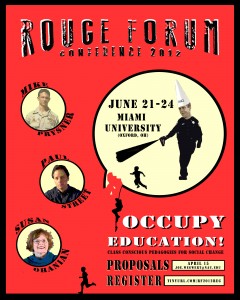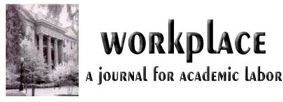#CFP Workplace Special Issue: Third Space Academic Labor
Guest Editor: Aaron Stoller, Colorado College
You are invited to submit proposals for a special issue of Workplace: A Journal for Academic Labor focusing on Third Space labor in higher education. Despite most colleges and universities’ equity and inclusion commitments, labor in higher education is organized, valued, and supported along a false and exclusionary dichotomy. On one side, the “academic” domain — occupied by faculty — is the site of expertise, critical nuance, and knowledge production. On the other, the “non-academic” domain — occupied by staff — is the site of non-intellectual and largely replaceable managerial activity. This labor binary underpins most aspects of university life, radiating into a culture of exclusion regarding professional support systems, agency in governance structures, labor contracts, and policy environments.
Although this dichotomy pervades almost all college campuses, the nature of academic labor is far more complex (Stoller, 2021). Since the late 1960s and early 1970s, colleges and universities have increasingly depended upon what Whitchurch terms Third Space academic labor (Whitchurch, 2013).
Working through problems of division and exploitation between so-called First and Third Worlds, Bhabha (1990; 2004) introduced the concept of Third Space as a creative, disruptive space of cultural production. Following Bhabha, in social theory Third Space has been used to resolve a range of binaries through the conceptualization of identities that trouble conventional ways of being and behaving. Scholars have used Third Space to examine disability, race, gender, and sexuality, where fluid identities disrupt rigid social categorizations and the cultural hierarchies that inevitably follow. Third Space identities are risky and dangerous because they span and complicate defined cultural categories. They are also spaces of creativity and innovation that open new cultural possibilities (Soja and Hooper, 1993).
Whitchurch uses Third Space to identify a non-binary social class within higher education: emerging groups of professionals who disrupt the false distinction between “academic” and “non-academic.” Third Space professionals work in diverse areas of the institution, such as academic advising, writing programs and centers, quantitative reasoning centers, honors programs, first-year experience and transitions programs, women’s and LGBTQ centers, accessibility resources, and teaching and learning centers among others.
By spanning, interweaving, and disrupting traditional notions of academic labor, Third Space professionals bring tremendous value to their institutions and students. They hold deep academic expertise in teaching and learning, increasing the university’s capacity for immersive and engaged pedagogies (Ho, 2000; Gibbs and Coffey, 2004). They also support the DEI missions of colleges and universities. Almost all Third Space professions developed in response to traditional faculty being unable or unwilling to serve students from marginalized, minoritized, and under-resourced backgrounds (Astin, 1971; Boquet, 1999; Carino, 1996; Groark and McCall, 2018). Because of their organizational positionality and academic expertise, they uniquely understand the student learning experience, and they are positioned to advocate for policy, structural, or curricular changes needed to create more equitable learning environments. Third Space professionals work across departmental lines and can identify and develop opportunities for cross-campus partnerships and interdisciplinary collaborations (Bickford & Whisnant, 2010). They create new forms of scholarship (Eatman, 2012, 2014) and have pluralistic forms of scholarly impact (Arguinis, Shapiro, Antonacopoulou, & Cummings, 2014). They advance multiple university goals, often using scholarly approaches to improve a campus’s understanding of an issue and use their knowledge to develop praxis-based scholarship that shapes national and international change movements (Janke, 2019). Because they have advanced degrees and often teach and conduct research, they also enhance the college’s portfolio and can enrich its curriculum.
Like other non-binary identities, Third Space professionals fall outside normative social categories and therefore face interpersonal, cultural, and structural challenges specific to their work and professional identities. Their work is consistently miscategorized within the academy’s false labor binary, resulting in it being reduced to a “mere” administrative activity (Stefani & Matthew, 2002; Green & Little, 2017), or an “illegitimate” form of scholarship (Rowland et al., 1998; Harland & Staniforth, 2003). Faculty often frame Third Space professional contributions in oppositional (rather than complementary) terms (Handal, 2008). Because they are coded as “non-academic” and not tied to “home” departments, their expertise is rendered invisible in the epistemic economy of the university (Solomon et al., 2006). They rarely have access to institutional support structures for their academic work (e.g., teaching, research, grants, and fellowships), although their contracts often include these activities as part of their professional duties (Bickford and Whisnant, 2010). Third Space professionals are often barred from receiving institutional recognition, such as institutional designations, named professorships, and teaching and research awards, simply because of their class category (Post, Ward, Longo, & Saltmarsh, 2016). Despite their academic expertise and connection to the teaching and research mission of the university, they are systematically excluded from university governance structures (Bessette, 2020a). They also have no clear pathways for professional growth (Kim, 2020; Bessette, 2020b) and yet are often criticized for “abandoning” their institutions for professional gain. Because their labor often performs a “helping” function, it is often coded as “feminine” and devalued as a result (Tipper, 1999; Leit et al., 2007; Bernhagen & Gravett, 2017). Conversely, because traditional academic labor is culturally assumed to be more desired and desirable, Third Space professionals are often coded as “failed” academics (Whitchurch, 2015, p. 86).
This cultural denigration of their labor means they are frequently the subject of bullying and micro- aggressions by traditional faculty, but because faculty enjoy the protections of tenure there is no possibility of accountability for workplace abuses suffered by Third Space professionals (Henderson, 2005; Perry, 2020).
This issue seeks articles that identify and conceptualize problems cutting across the diverse forms of Third Space labor, and articles that propose pathways forward. Questions addressed by articles might include but are not limited to:
- How might we redefine the nature of academic labor from a Third Space positionality, or how might we create language that more adequately describes Third Space academic labor?
- What are the theoretical and practical connections that unify diverse forms of Third Space labor and professional identities?
- What are the material, structural, and cultural barriers to supporting and legitimizing Third Space
academic labor?
- How might we organize and create solidarity between Third Space laborers nationally and internationally?
Inquiries or to Submit:
For inquiries or to submit proposals, contact Aaron Stoller at astoller@coloradocollege.edu. Prospective contributors should submit a proposal of 1-2 pages plus bibliography and a 1-paragraph author bio to Aaron Stoller astoller@coloradocollege.edu. Final contributions should be between 5,000 – 8,000 words and follow APA style.
Timeline
- Call for Proposals: April – June 2022
- Peer Review and Acceptance of Proposals: July – October 2022
- Full Drafts of Papers: February 2023
- Issue Publication: March 2023
Workplace: A Journal for Academic Labor
Workplace: A Journal for Academic Labor is a refereed, open access journal published by the Institute for Critical Education Studies (ICES) and a collective of scholars in critical university studies, or critical higher education, promoting dignity and integrity in academic work. Contributions are aimed at higher education workplace scholar-activism and dialogue on all issues of academic labor.


 Follow
Follow

